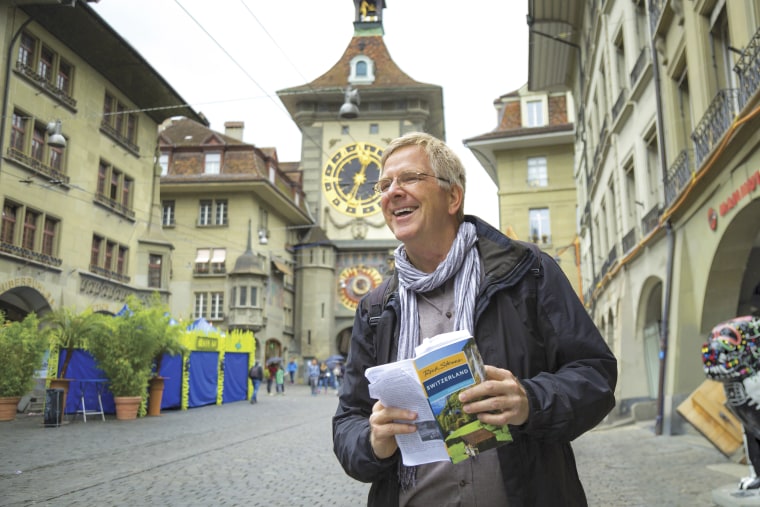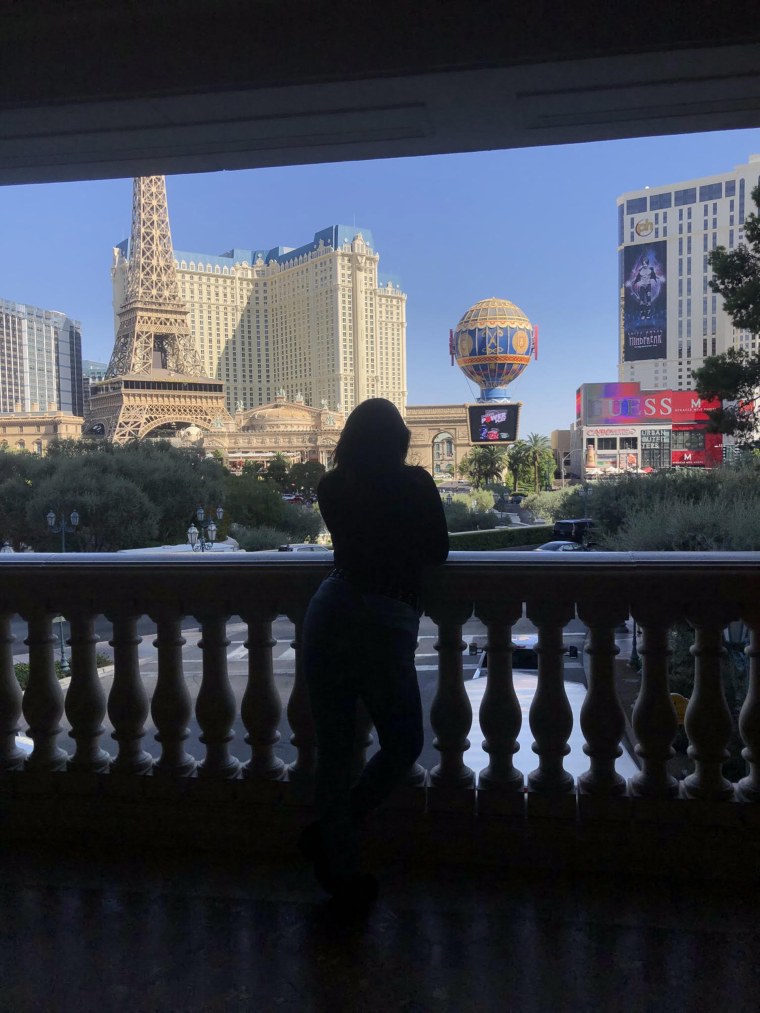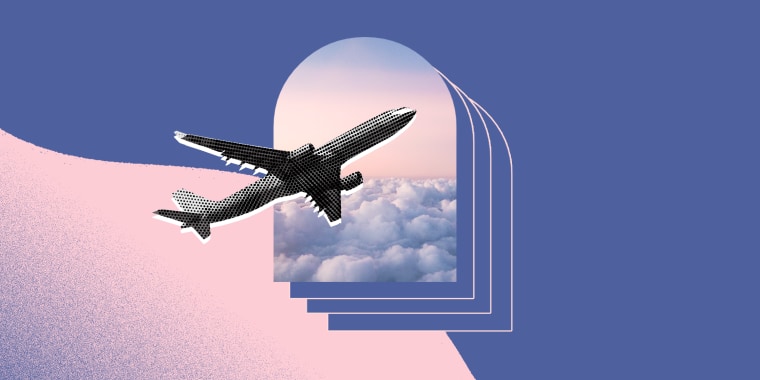It was early March when Valeria Martinez, a 21-year-old college student in New York City, decided to postpone her spring break trip to Iceland.

"We heard of the European travel ban and we obviously got freaked out by it," Martinez told TODAY. Even though Iceland wasn’t a hot spot for COVID-19, the disease caused by the novel coronavirus, she and her friends worried that they wouldn’t be allowed back into the United States.
And flying from New York — which has had more than 300,000 confirmed cases so far — the classmates knew they posed a risk to others. "It's not really considerate of us to stay in Airbnbs and go to public places while carrying a virus we may not be aware of," she said.
But when will it be safe to travel again?
Download the TODAY app for the latest coverage on the coronavirus outbreak.
According to a recent Harris Poll, 51% of Americans have canceled or postponed travel due to concerns about COVID-19, the disease caused by the novel coronavirus. Only 49% of Americans said they would be ready to fly six months after the government says the virus is abating. And with millions of Americans out of work, many won't be able to afford a vacation anytime soon.
Airlines have been canceling flights amid decreased demand as governments have worked to flatten the curve. Since March 23, U.S. airlines have canceled nearly 220,000 flights nationwide and nearly 50,000 flights have been canceled in Europe, according to the airline and flight-tracking website FlightStats.
Dennis Tajer, an American Airlines captain and spokesperson for the Allied Pilots Association, the airline's labor union, told TODAY that American Airlines canceled all flights to China in January after pilots refused to fly there and to Hong Kong and filed a lawsuit to ensure the cancellations.
"When we get to the other side of this, I think everyone is going to take baby steps toward the new normal," he said. "Anybody that comes out of the gate running should be harnessed. Be cautious, be disciplined but don't be afraid."
To ensure further safety of crew members and passengers, the APA has called for more rigorous screening by the Transportation Security Administration, including temperature scans and requesting additional information from passengers. Tajer believes these measures, paired with appropriate safety gear supplied for crew members, such as masks and gloves, will help give Americans the confidence to travel safely again.
A representative from the TSA told TODAY that the agency will be monitoring the COVID-19 situation, looking at projections and will be working with airlines and airports to ensure its operations will match the need in relation to people traveling.
When will international travel ramp up again?
In addition to a reduction in flights, airfare has continued to drop. Last month, CNET found a $23 ticket from Boston to San Juan, Puerto Rico, an extreme drop from the $300 it would have been in February. And recently, the Italian island of Sicily said it would pay for part of people's travel costs to visit later in the year.
Despite these incentives, experts still suggest holding off on travel for now. The U.S. Centers for Disease Control and Prevention advises that all nonessential international travel should be avoided. And back in March, the U.S. State Department raised its global travel advisory to level 4: Do not travel. According to the department's advisory, "U.S. citizens who live in the United States should arrange for immediate return to the United States, unless they are prepared to remain abroad for an indefinite period."
"If you're talking about international travel, I don't think anybody should be planning to go anywhere this year," American travel writer and television host Rick Steves told TODAY from his home in Seattle. "I mean, you can hope, and I'm hoping."

Steves organizes guided tours in Europe and has several planned for later this year. While he hopes they can still have the tours, he is "psychologically prepared" if they need to be canceled.
And Steves hasn't officially canceled his own large family European vacation planned for early June but plans to postpone the trip to 2021.
"Anybody who is champing at the bit to go to Europe this year needs to just relax," he said. "If it happens, it happens. But be prepared, emotionally and psychologically, especially if you are on an organized tour, to hold off."
Dr. Naomi Rogers, a professor of the history of medicine at Yale University, told TODAY that airline travel might be safe by June as airports remain open and people continue to fly. And while places like Iceland might be appealing for the great outdoors, Rogers warns of other roadblocks for social distancing.
"Where are you going to stay?" she said. "And how are you going to make sure that the place you are going to stay in is safe enough? Maybe those things can be figured out, but that and airports is what worries me.”
Kryštof Gogela, a 17-year-old from the Czech Republic, has been planning and saving to travel to the United States for the last four years. Now, he has different plans.
"Because of the whole coronavirus situation, we were told we would be unable to make our trip in time because we were supposed to leave in June," he said. "So for the past few months, I've been really into South America and the U.S., so we have discussed it in our family and have decided to rebook our trip to a new one and go to South America instead."
Gogela is planning on traveling to Buenos Aires, Argentina, in late October with his grandfather. While there is still chance they may have to cancel or rebook again, Gogela is trying to stay positive.
"I've been told that our chances are around 70% that we will be able to go," he said. "But I'll let the time tell."
Travel expert Misty Belles of Virtuoso recently told TODAY's Al Roker that international travel will take longer to revive compared to domestic travel because not only are people wary of flying, but countries might not open up their borders right away. "The travel sweet spot for international is really about nine months out," she said, which coincides with holiday travel.
What about travel within the U.S.?
Belles believes that regional travel will come back first. "People have been cooped up for a long time," she said. "They're going to look to get out. But they're not going to want to venture too far from home." That means driving destinations that are a few hours away from home will be popular along with outdoor destinations like state and national parks.
Eli Finkelson, a 20-year-old student at New York's Hofsta University, has been planning a trip for her 21st birthday this August with her two best friends since the ninth grade. It wasn't until January that they decided upon Nashville, Tennessee. With their trip still months away, Finkelson and her friends understand the precautions they may have to take.

"I think we're planning on playing it by ear right now," she told TODAY from her home in New Hampshire. "We're probably all going to bring masks. I'm not really sure how much sightseeing we'll do."
While avoiding crowded bars and practicing other forms of social distancing is something Finkelson and her friends can do, their biggest concern is having to reschedule flights.
"I just spent a bunch of money," she said. "I don't want to get sick because then I'll have a really hard time recovering if I get sick. But it's my 21st birthday."
Finkelson, who has severe asthma, understands the risks of traveling so soon. The Airbnb that she and her friends are renting is advertised as a "**SANITIZED CONDO**" in the listing.
"I just want a couple days in the sunshine with my friends," she said. "I just need to get out of the house. It will have been months back here; I'm not used to be cooped up in a place — being in New York City three or four days a week. I just want to be in 90-degree weather with my friends for a couple days. I'm walking to Nashville if I have to."
Although Rogers considers domestic travel to be a crucial part of her ordinary life for research and conferences, she’s holding off for now. The coronavirus pandemic means that no libraries or archives are open.
As for the future of travel, Rogers is concerned there could be a second wave of coronavirus.
“Depending on how much we sort of relax self-isolation and social distancing, it could again hit the most vulnerable just when you think, 'Oh OK, we want to go back to the mall,’” she said. “I think there is a danger of too soon.”
However, she understands people’s deep desires to explore the world. "I am self-isolating with my husband, who is terribly sad about not being able to travel," Rogers said. "He loves to go to exotic and unusual places, and I think that — I know that there are many people like that who really want to get back to the world."
What is the new normal?
People want to travel in a way in which they feel “safe enough,” said Rogers. "And I don't quite know how ‘safe enough’ is going to work."
Just as 9/11 changed the way we travel, the pandemic will usher in sweeping changes. Already, airlines like JetBlue and Delta have announced requirements for passengers to wear face coverings throughout their travels.
Rogers recalled how the AIDS crisis in 1988 changed hygienic infrastructure as we know it. "I remember when I was a child and I would go to the dentist and no one ever wore gloves,” she said. “They didn't wear masks, none of it. That was a post-1988 development."
Rick Steves, on the other hand, has no doubt that travel will get back to the normal we are used to; the main question is when.
"We got back to normal after 9/11; we got back to normal after different terrorist attacks and economic crises and wars and so on," he said. "Demand for travel does not dissipate; it's pent up and then it springs back when the coast is clear."
CORRECTION (May 7, 2020, 12:20 p.m.): An earlier version of the article misspelled the name of Kryštof Gogela. It is Kryštof Gogela, not Krεstoph Gogola.

